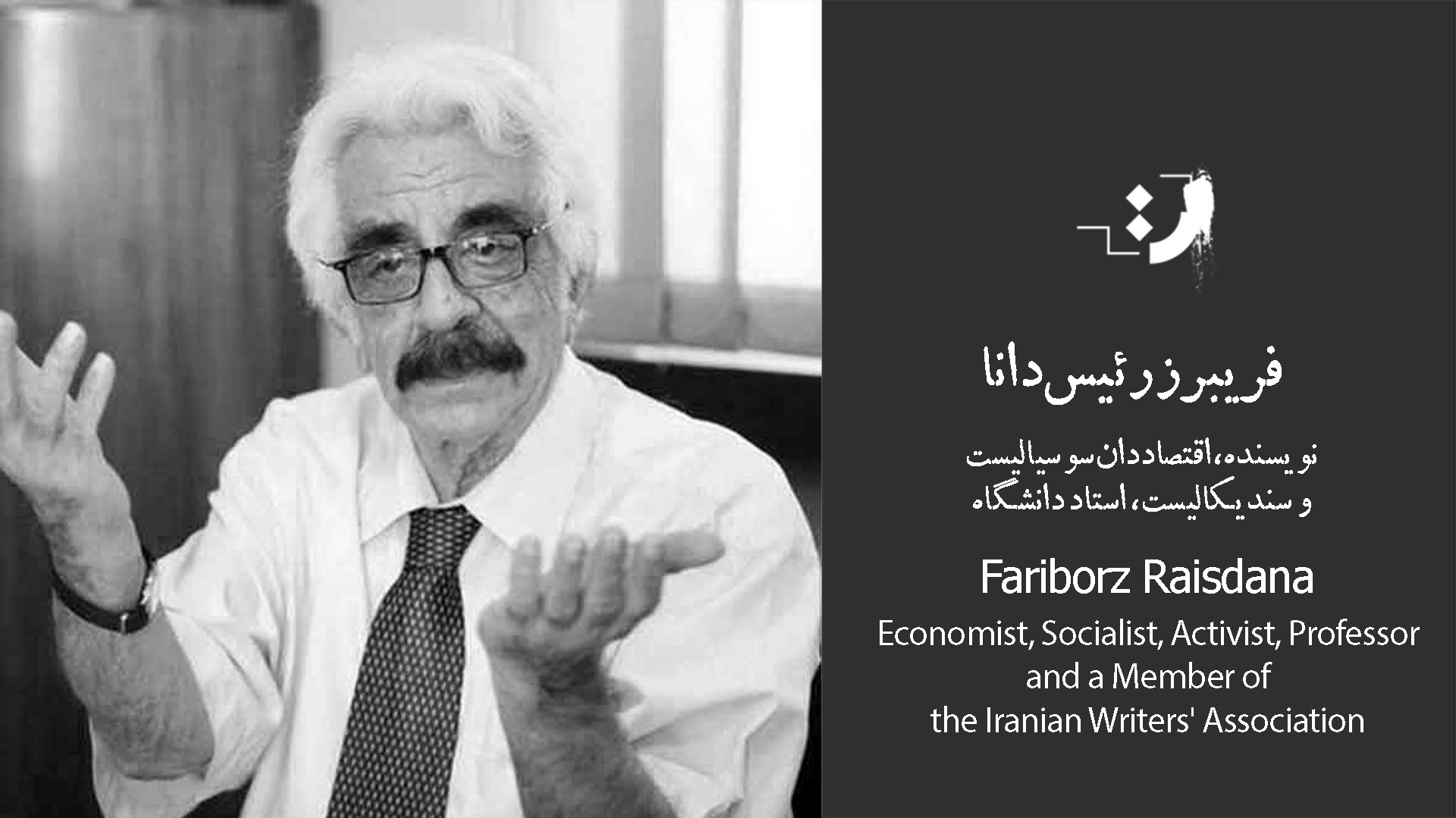Fariborz Raisdana

Biography
Fariborz Raisdana (19 January 1945 – 16 March 2020) was an Iranian economist, socialist, syndicalist, professor of economics, human rights activist, political prisoner, and a member of the Iranian Writers’ Association (Persian: کانون نویسندگان ایران). Raisdana was a leftist economist educated at the London School of Economics. In addition to his expertise in economic research and teaching, he was actively involved in political, social, literary, and journalistic activities. He was a prominent intellectual figure in Iran, advocating for democracy, social justice, and socialism. He authored more than fifteen books on economic and political issues, such as Freedom and Socialism, The Political Economy of Development, and The Intellectual Character.
Early Life
Fariborz Raisdana was born on 19 January 1945 in Tehran. His family origins trace back to the village of Ebrahimabad in Buin Zahra, Qazvin plain. His original surname was “Rais-Danayi” (رئیسدانائی), but due to a clerical error in the civil registry, it was recorded as “Raisdana,” a name he chose to keep. His father, Haji Khan, was a laboratory doctor in Tehran and a landowner in Ebrahimabad. As a child, Raisdana spent summers in his ancestral village.
Growing up in Tehran’s Shapour neighborhood, he attended Molavi Elementary School and later Hakim Nezami High School in Khaniabad. His experience as a privileged child of a “Khan,” contrasted with the poverty and hardships faced by the villagers, deeply influenced his awareness of social inequalities. He later reflected on these early observations in his essay A Lesson from the Tale of the Bathhouse Horn, where he described how the stark contrasts of wealth and deprivation shaped his political consciousness. Later in life, he distributed his father’s lands among local farmers and requested to be buried in either Ebrahimabad or Imamzadeh Taher Cemetery, ultimately resting in his ancestral village.
Political Involvement and Shift Towards Socialism
As a teenager, Raisdana witnessed the nationalization of Iran’s oil industry and the 1953 coup d’état (28 Mordad coup). At the age of 16, he joined the Second National Front of Iran. Due to his membership in the Youth Organization of the National Front, he was arrested multiple times. He greatly admired Mohammad Mossadegh, an admiration that persisted even as he later critically analyzed his policies.
During his university years, Raisdana’s political stance evolved. Initially aligned with the National Front, he gravitated towards leftist ideologies due to his changing views, interactions with figures like Ahmad Jalil-Fashar, Hassan Zia-Zarifi, and Bijan Jazani, and exposure to socialist movements both in Iran and abroad. This ideological transformation led to his arrest by SAVAK, the Shah’s secret police, for his socialist affiliations. After his release, he fled Iran using a fake passport, traveling to Germany, Turkey, Lebanon, Bulgaria, and finally England.
Education and Academic Career
Raisdana earned his Bachelor’s and Master’s degrees in Economics and Econometrics from the Iranian National University (now Shahid Beheshti University). He later pursued a PhD in Economics at the London School of Economics (LSE), a hub for leftist intellectuals at the time. One of his professors, Amartya Sen, deeply influenced his views on social justice. His doctoral dissertation focused on rural-to-urban labor migration in developing countries.
While in London, he briefly taught as an assistant professor of mathematical economics at LSE and attended advanced courses in “Economics of Technology.” He also studied labor demographics and agricultural societies at City, University of London, though he left that program unfinished.
During his time in the UK, Raisdana actively participated in political activism, joining the Confederation of Iranian Students and later aligning with socialist organizations.
Return to Iran and Activism
Following the 1979 Iranian Revolution, Raisdana returned to Iran and resumed academic and activist work. He was a leading member of the Iranian Writers’ Association, playing a crucial role in advocating for freedom of speech and press. His unwavering commitment to intellectual freedom placed him on the security forces’ watchlist, particularly during the 1980s and 1990s, when several of his fellow activists were assassinated in Iran’s chain murders of intellectuals.
In the 1990s, Raisdana was deeply involved in organizing memorials and public events, including the funeral of poet Ahmad Shamloo in 2000, despite government restrictions. He was also one of the last people to see Mohammad Jafar Pouyandeh, a writer and translator who was murdered in the 1998 chain killings. On the day of his disappearance, Pouyandeh expressed concerns about being followed, and the two left a meeting together, encountering a suspicious taxi that insisted on giving them a ride. Raisdana declined, but later realized the taxi had likely been part of a planned abduction.
Imprisonment and Persecution
Raisdana was arrested on 21 March 2012 in Tehran after criticizing Iran’s subsidy reform plan in an interview with BBC Persian. He was sentenced to one year in Evin Prison for charges including:
Membership in the Iranian Writers’ Association
Issuing statements against the regime
Giving interviews to BBC and Voice of America (VOA)
Accusing the Iranian government of human rights violations and conducting show trials
His arrest sparked protests from international organizations, including the Middle East Economic Association and the Workers’ Rights Defenders.
Teaching Career
Raisdana taught at several universities in Iran, including Tehran University, Shahid Beheshti University, Allameh Tabataba’i University, and The University of Social Welfare and Rehabilitation Sciences (USWR). However, his radical views often clashed with Iran’s academic establishment, limiting his academic appointments.
In 1999, he was a key organizer of the “Poverty in Iran” conference, alongside scholars such as Parviz Piran and Zhaleh Shadi-Talab.
Death and Legacy
Fariborz Raisdana passed away on 16 March 2020 due to complications from COVID-19 at Tehran Pars Hospital. He was buried in Ebrahimabad, his birthplace.
Throughout his life, Raisdana remained a steadfast advocate for social justice, democracy, and socialism. His intellectual contributions continue to inspire economists, activists, and human rights defenders in Iran and beyond.
- Birthday: January 19, 1945
- Death: March 16, 2020
- Birthplace: Tehran, Tehran, Iran
Economist, Socialist, Activist, Professor and a Member of the Iranian Writers’ Association
